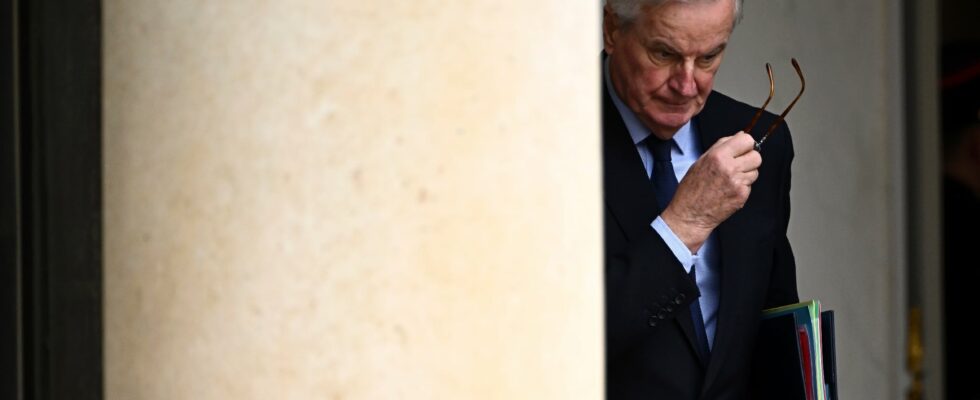What if France was more likely to have snow at Christmas than a budget for the year 2025? The little music plays in the corridors of the palaces of the Republic and becomes louder as the National Rally raises threats of censorship in the event of 49.3 on one of the three budgetary texts – the bill for financing the social security (PLFSS) and the end of management project for the current year will be submitted to the vote of deputies this week, the finance bill (PLF) 2025 will be submitted around December 20.
On the first day of the Advent calendar, Marine Le Pen announced at nightfall that she was ending discussions with the executive on the Social Security Budget. The specter of a vote of censure grew even stronger the next morning. On the airwaves of RTL this Monday, December 2, the head of the flame party Jordan Bardella assures: “The RN will obviously censor this government, barring a last minute miracle.” Will Michel Barnier therefore be entitled to his Christmas miracle? If he does not give the pledges that the RN expects of him, an unprecedented situation under the Fifth Republic would arise: a government censored on the altar of voting on a budgetary text.
Precedents that aren’t really precedents
In 1979, Raymond Barre and his ministers had to patch up an emergency finance law after censure from the Constitutional Council at Christmas turkey time for non-compliance with procedure. But the then Prime Minister had not fallen and had an absolute majority in the National Assembly which had voted on the 1980 Budget. As for the often cited “precedent” of 1962, the lower house having been dissolved in October after the overthrow of Georges Pompidou, the resigning government managed to provide France with a budget by triggering article 47 of the Constitution. In paragraph 3, the text provides that “if Parliament has not decided within seventy days, the provisions of the bill may be brought into force by ordinance”.
Sleight of hand thought up by General de Gaulle and used by the latter which Michel Barnier could adopt in the event of censorship? Difficult, according to Anne Levade, professor of public law at Panthéon-Sorbonne University. “If a motion of censure following a 49.3 is not passed, the law is considered to have been adopted. Conversely, if it is passed, the government is overthrown and the law is rejected. But in both cases, the National Assembly has ruled on the text, therefore the situation does not fall within the scope of article 47 of the Constitution. On the other hand, Michel Barnier – or rather his common base, which he receives this Monday at the start of the afternoon – could try to play for time. Implicitly, dragging out the debates and thus preventing a vote on the text, as was the case for the last parliamentary niche of the rebels who had included the repeal of the pension reform on the agenda.
Michel Barnier, new master of clocks?
This year, deputies have until December 21 to decide on the 2025 finance bill. If the elected frontists do not censure the government on one of the two texts voted this week at the Palais Bourbon, the Savoyard could prefer 49.3 on the 2025 Budget to 47.3 of the Constitution. “This would allow it to ensure the continuity of the State by having Parliament vote for a law authorizing the levy of tax and thus ensure the irreducible expenditure of the State”, deciphers Anne Levade. But beyond creating a situation conducive to the use of article 47 which is not self-evident, Michel Barnier will have to deal with two other obstacles.
The first, the vote on the law authorizing the collection of tax by a chamber which has continued to give him a hard time since his arrival at the Hôtel de Matignon. The second, the one who appointed him there. “The use of article 47 would allow Michel Barnier’s government to avoid censorship, but the Prime Minister would risk having to comply with Emmanuel Macron’s demands,” underlines Guillaume Drago, professor of public law at the university. Panthéon-Assas Paris II. Because to be adopted, an ordinance must be signed with the seal of the Elysée. For Guillaume Drago, there is no doubt that the president will make use of this position to negotiate withdrawals of tax increases, a red line in Macronist policy since 2017. With his head saved, Michel Barnier will therefore not have a completely free hand.
Whether he resists or crashes against the wall of censorship, his government nevertheless has a third option. Article 45 of the organic law relating to finance laws (LOLF) would allow the government – even if it has resigned – to urgently pass a text allowing the State to “collect existing taxes until the vote on the finance law “, specifies paragraph 4 of the text. Thus, the famous “twelve provisional” system, often used under the Fourth Republic, would apply. The principle is simple: “cut into 12 tranches, the 2024 budget would be renewed identically each month until the deputies find common ground for a new budget”, summarizes the constitutionalist Guillaume Drago. The 1963 PLF debates extended until January 28. With such an archipelago hemicycle, those in the 2025 budget could well see the first buds of spring bloom.
.
